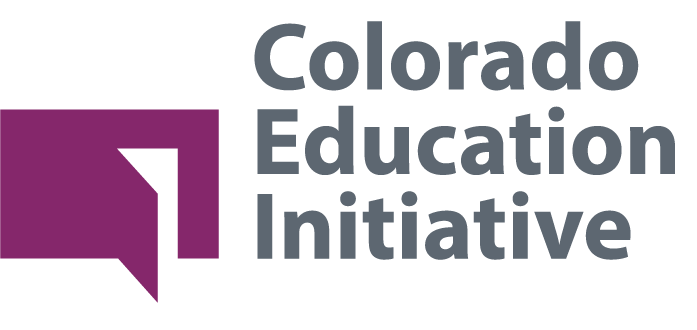A Conversation with Rebecca Holmes
January 18, 2017
January 18, 2017
New CEO opens up about leading CEI
What drives your commitment to education in Colorado?
A mentor of mine helped me see the power of teaching and leading in a community you know deeply and I moved home right after college to teach just a few blocks from my own high school. That experience helped shape what I still believe about the power of community engagement in education, and the importance of community context, in all I’ve done since.
When I’ve worked with leaders from other states they are always shocked by how little happens in a “top-down” way in Colorado. Our ethos about partnerships and the entrepreneurial spirit of Colorado are in the air here and it’s exciting to see what happens when we embrace that in education.
How has your professional experience prepared you to lead CEI?
As a teacher in my classroom almost twenty years ago, I remember feeling torn between certainty that the school level work was what most mattered for young people and a sense that the “systems conditions” the school, and those of us in it, had to work in and against no longer made sense for getting to the outcomes our students most needed. We didn’t really use language about “nimble and responsive systems” then, but looking back at everything I’ve worked on since leaving the classroom, the idea of systems really built for the evolving needs of students is what has remained constant. Systems like that require robust and constant learning at all levels.
I’ve led a small school system, learned a great deal from superintendents and building leaders across the state, and have seen firsthand what policy can and cannot achieve on its own. All of these experiences have me convinced that there is a critical role across our state for a third party organization like CEI.
CEI turns 10 years old this year. What are you most excited about regarding the future of CEI?
We have phenomenal work going on in schools and districts in Colorado. Too often, these stories don’t get told and, more importantly, they don’t get told in ways that help others learn from them in actionable ways. I’ve felt this gap in many roles over the last decade and no one is better positioned to help address it than CEI.
Additionally, I’ve had several district and school leaders tell me that their work with CEI helped shift a mindset about what’s possible. That’s hard to measure but it’s exciting to hear; we all know that empowered teachers and leaders are critical for breakthrough student results.
Finally, CEI is going to work with our partners to help address what equity means in a uniquely Colorado context. Our student demographics have shifted dramatically and will continue to, and we still have longstanding equity gaps like rural funding and support for students with special needs that we haven’t addressed thoroughly. Sometimes our approach to equity in education is approached as a compliance activity. When you’re grounded in the stories about what’s possible for all students – when you get into the field and see young people leading in remarkable ways in their schools and communities – this becomes an exciting call to action.
What is one of your favorite memories from your time in schools?
One of the reasons I love middle school students is their growing convictions about the world and their excitement about getting involved in the communities around them. A group of 7th graders was learning about food science and about civic engagement at the same time. They decided I was the linchpin to making changes they wanted to see in our school food program and started lobbying me with letters and appeals. I came into my office one morning and found a rock-hard piece of fruit on my desk with a note that just said: “We need to talk.” I’ve always been passionate about student agency in learning and appreciate what happens when you unleash that!
